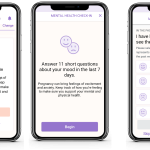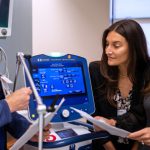Every year, nearly half a million babies in the United States are born prematurely. Tiny infants whose lungs are too fragile to sustain normal breathing spend the first hours of their lives in sterile plastic boxes hooked up to tubes and monitors, until the medical team deems them strong enough to cuddle on their mothers’ chests.
But the steroid drugs that help reduce inflammation and support preemies’ lung development often come at a cost that pediatricians and families aren’t willing to pay. The babies risk developing neurological complications, including cerebral palsy and susceptibility to depression, because of the reduction in their brain size and pruning of connections between nerve cells.
Fortunately, a solution might already be on its way. In a paper published this month in the journal Neurobiology of Disease, a team of researchers and clinicians from the University of Pittsburgh School of Medicine reported that an inhaled medication approved for the treatment of asthma in young children can provide beneficial effects in the lungs of newborn rats without generating adverse effects in the brain.
“We are very excited and encouraged by our findings and hope that translating them into clinical applications won’t take long,” said senior author Dr. Donald DeFranco, professor at Pitt’s Department of Pharmacology and Chemical Biology. “An effective drug that treats lung injury in neonates without raising serious concerns for neurodevelopmental side effects would make a big difference for doctors who are taking care of those patients.”
In a preclinical study conducted at Pitt, the scientists found that ciclesonide – an asthma drug that activates the same receptors as the common steroid dexamethasone – decreases markers of lung inflammation and encourages blood vessel repair but, unlike dexamethasone, does not cause any structural or molecular changes in the brain.
The key, DeFranco thinks, is in the way ciclesonide gets processed in the body. Instead of acting on molecular targets scattered throughout, it is activated only in limited tissues in the body, such as the lower airways of the lung.
“Being involved in a study that has a chance to lead to treatments for premature infants is very exciting,” said co-lead author Juliann Jaumotte, research scientist at the Pittsburgh Institute for Neurodegenerative Diseases. “When I started treating newborn rats with dexamethasone and ciclesonide, I was shocked at how different the effects were. Animals treated with dexamethasone would be frail and underweight, when rats that received ciclesonide were behaving normally.”
Encouraged by the promising results, the team is launching a collaboration with colleagues from Children’s Mercy Hospital in Kansas City to see if ciclesonide can help human babies in NICUs.
The urgency to improve clinical management of lung disease became even more pressing in an era dominated by the COVID-19 pandemic. The researchers say that developing safer alternatives to steroid drugs for patients hospitalized with severe COVID-19 might be especially beneficial for pregnant women who are concerned with potential long-term effects on their babies.
“Premature babies are such a vulnerable population. We’ve come leaps and bounds in our ability to support their recovery and survival, but we can still do better,” said co-lead author Dr. Alexis Franks, assistant professor of pediatrics at Pitt. “The opportunity to develop new therapies that act as equalizers to help babies reach neurodevelopmental goals, regardless of whether or not they were born early, will level the playing field and give kids a better chance at reaching their full potential.”









